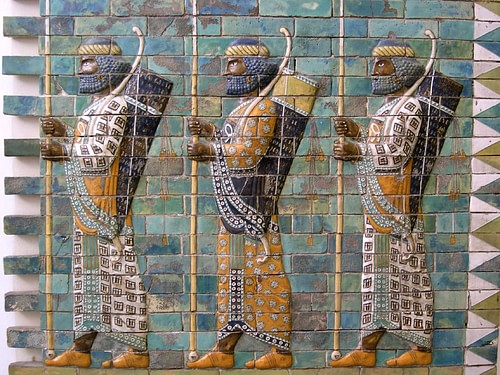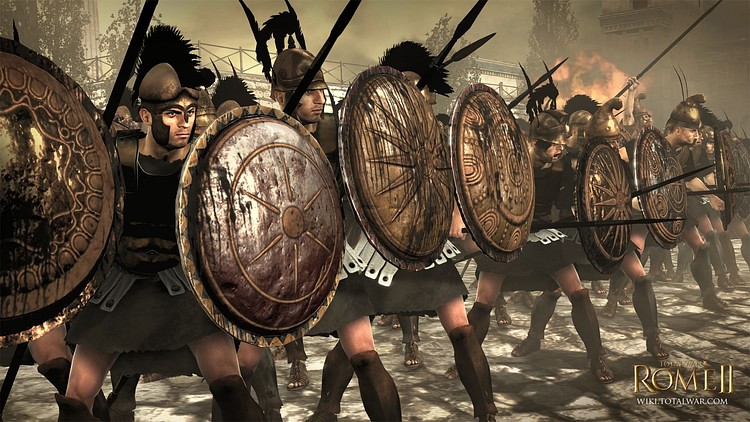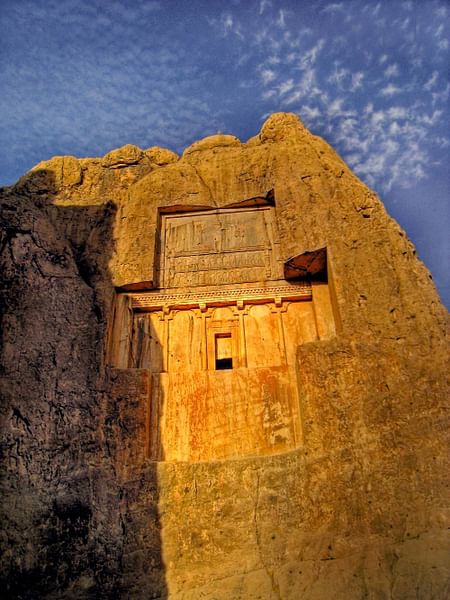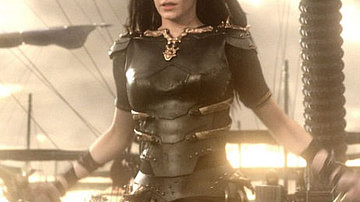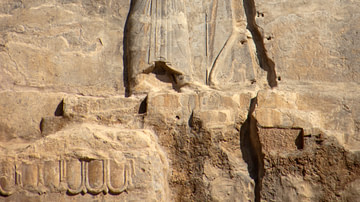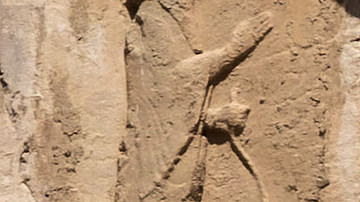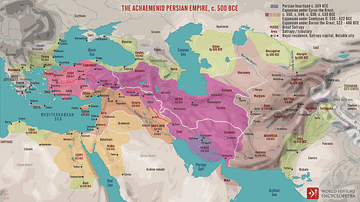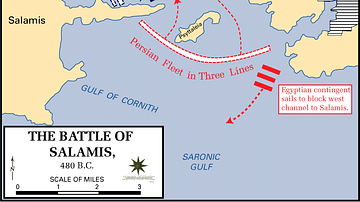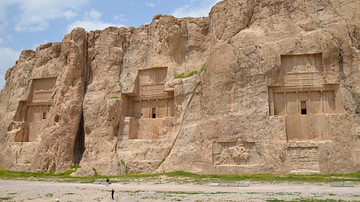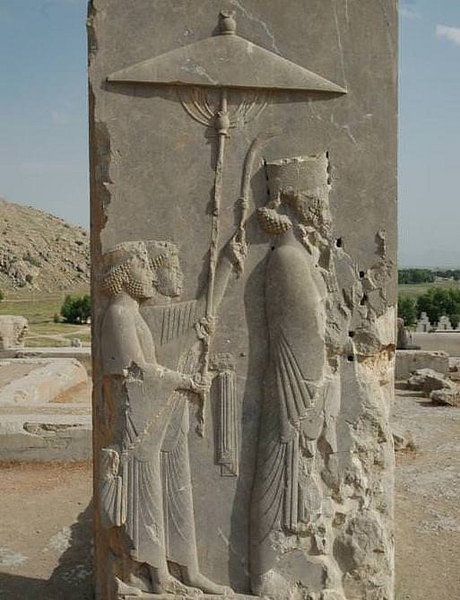
Xerxes I (l. 519-465, r. 486-465 BCE), also known as Xerxes the Great, was the king of the Persian Achaemenid Empire. His official title was Shahanshah which, though usually translated as `emperor', actually means `king of kings'. He is identified as the Ahasuerus of Persia in the biblical Book of Esther (although his son, Artaxerxes I, is also a possibility as is Artaxerxes II) and is referenced at length in the works of Herodotus, Diodorus Siculus, Quintus Curtius Rufus, and, to a lesser extent, in Plutarch. Herodotus is the primary source for the story of his expedition to Greece. The name `Xerxes' is the Greek version of the Persian `Khshayarsa' (or Khashyar Shah), and so he is known in the west as `Xerxes' but in the east as `Khshayarsa'.
His mother was Atossa, the daughter of Cyrus the Great (r. c. 550-530 BCE) who founded the Achaemenid Empire. He was, therefore, accepted as a great king before having to prove himself so in any way. Xerxes is celebrated for his many building projects throughout his empire but is best known, in both ancient and modern sources, for the massive expedition he mounted against Greece in 480 BCE which, according to Herodotus, assembled the largest and most well equipped fighting force ever put into the field up to that point.
He was the son of Darius the Great (r. 522-486 BCE) who, in an effort to punish Athens for their support of the Ionian colonies' revolt against Persian rule in 499 BCE, had invaded Greece in 492 BCE. The Persians were defeated by the Greek forces at the Battle of Marathon in 490 BCE, and Darius died in 486 BCE before he could mount another offensive. It, therefore, fell to his son to carry out his father's wishes and, in amassing an army of such size and strength, Xerxes felt confident of his success in achieving what the great Darius had been unable to realize but would wind up failing just as his father had.
Early Campaigns
Xerxes was not the eldest of Darius' sons but, as the first-born of his marriage with Atossa, was chosen as successor. Upon Darius' death, Xerxes' older half-brother, Artabazenes, claimed the throne but was rebuffed because his mother was a commoner while Xerxes' mother was the daughter of the great Cyrus.
He married the princess Amestris, daughter of Otanes, who would become mother to his sons Darius, Hystaspes, Artaxerxes I (r. 465-424 BCE, Achamenes, and daughters Amytis and Rhodogune. Upon assuming the throne, Xerxes' Commander-in-Chief of the Army, Mardonius (who was also his cousin and brother-in-law), pressured him to renew the campaign against Greece. Mardonius' motives, it seems, were personal, as he hoped to rule the conquered nation as Satrap following Xerxes' victory.
Xerxes' uncle and advisor, Artabanus, tried to persuade him to abandon the expedition but Mardonius' arguments prevailed. Even so, there were many matters to attend to such as the insurrection of Babylon and the revolts against Persian rule in Egypt, and Xerxes expended considerable time throughout the year 485 BCE in quelling these and restoring order.
Although his grandfather Cyrus had been a friend to Babylon, Xerxes had subjugated the city and melted down the golden statue of Marduk, their patron deity. This was a particular affront to the dignity and tradition of Babylon because one of the religious duties of a ruler was to grasp the hands of the statue of Marduk at the New Year's festival in order to ensure continued prosperity throughout the land; Babylon thus enjoyed a prestige among the cities of Mesopotamia as the site of this ritual.
Cyrus had been diligent in officiating at the festival, as had Darius, but Xerxes considered it a matter of little consequence. He ignored the established relationships with former allies, referring to himself as the King of the Persians and the Medes, and treated all as subject to his rule. Babylon revolted against him twice before he lay siege to it and crushed the rebellion.
Greece: The Persian Wars
With relative peace established in his empire, he again turned his attention to Greece and conquest. He spent four years amassing enough supplies and weaponry for the campaign and also conscripting as many men as he could from various regions to ensure his victory.
Herodotus tells the story of Pythias the Lydian (a descendant of King Croesus) whose five sons were among those conscripted. Pythias hosted the king and his army lavishly at Sardis in the winter of 481-480 BCE and offered to give Xerxes a considerable sum of money for the campaign, but Xerxes refused his offer and, instead, rewarded Pythias for his generosity by adding greatly to his treasury.
Prior to Xerxes' departure for the Hellespont, a bad omen in the form of an eclipse appeared in the sky but Xerxes, assured by his diviners that it meant nothing, proceeded with his plans. Pythias, however, recognized the omen as a warning of impending doom and, emboldened by Xerxes' generosity and kindness, asked if his eldest son could be released from the army so that he would have at least one son to care for him in his old age and carry on as heir. Xerxes became enraged at this request as it meant that Pythias doubted his chances of success. He had the eldest son removed from the ranks, cut him in half, placed the two sections of the corpse on either side of the road, and marched his troops away between them.
According to Herodotus, the size of Xerxes' expeditionary force was over two million men and four thousand ships. Diodorus Siculus and Quintus Curtius Rufus confirm the enormity of Xerxes' army, though their numbers differ from Herodotus and from each other. In order to move his ships freely, he had a canal dug across the Isthmus of Actium near Mr. Athos, the remains of which are still visible in the present day. He assembled his forces to cross the Hellespont into Europe and, Herodotus reports, watched them as they stood in formation. The size of the army and its majesty
first gave Xerxes a feeling of deep self-satisfaction, but later he began to weep. When his uncle, Artabanus (the one who had at first freely expressed his opinion and advised Xerxes not to attack Greece) noticed that Xerxes was crying he said, `My lord, a short while ago you were feeling happy with your situation and now you are weeping. What a total change of mood!' `Yes,” Xerxes answered. `I was reflecting on things and it occurred to me how short the sum total of human life is, which made me feel compassion. Look at all these people – but not one of them will still be alive in a hundred years' time'(VII.45-46).
Even so, Xerxes put the thoughts of the brevity of life from his mind and ordered the crossing and the invasion of Greece.
The omens, from the start, were not favorable to Xerxes' cause. The Hellespont is said to have risen in revolt at his crossing. In order to move his massive force, Xerxes built bridges across the water. Herodotus writes:
The Phoenicians and the Egyptians who had been assigned the task set about building their bridges (the Phoenicians using white flax and the Egyptians papyrus), taking Abydus as their starting point and directing their efforts towards the headland on the opposite coast – a distance of seven stades. They had just finished bridging the straits when a violent storm erupted which completely smashed and destroyed everything. This news made Xerxes furious. He ordered his men to give the Hellespont three hundred lashes and to sink a pair of shackles into the sea. I once heard that they also dispatched men to brand the Hellespont as well. Be that as it may, he did tell the men he had thrashing the sea to revile it in terms you would never hear from a Greek. “Bitter water,” they said, this is your punishment for wronging your master when he did no wrong to you. King Xerxes will cross you, with or without your consent. People are right not to sacrifice to a muddy, brackish stream like you!” So the sea was punished at his orders and he had the supervisors of the bridging of the Hellespont beheaded. The men assigned this grotesque task carried out their orders and another team of engineers managed to bridge the Hellespont (VII.34-36).
Once they had reached the other side, Herodotus writes, “a really extraordinary thing happened: a horse gave birth to a hare. Xerxes dismissed it as insignificant, though its meaning was transparent. It meant that, although Xerxes would walk tall and proud on his way to attack Greece, he would return to his starting-point running for his life” (VII.57).
Besides the revolt of the waters of the Hellespont and the appearance of the hare, there were other omens which indicated that Xerxes' campaign would end badly, but Xerxes dismissed all of them as meaningless and proceeded on toward his goal.
The Greeks, in the meantime, had mobilized their forces under the direction of Athens and sent forces to meet the Persian expedition and defend the mainland. The battles of Artemisium and Thermopylae, fought more or less concurrently, provided the Persians with victories (either complete or strategic) which enabled them access to Greece, and they marched on Athens as soon as they were able. Xerxes was so enraged at the Athenian resistance to his wishes that he burned the city in a furious fit, which he so regretted that, later, he would reference this as his only remorse in the entire campaign.
![Greek Trireme [Artist's Impression]](https://www.worldhistory.org/img/r/p/500x600/4650.jpg?v=1710090064)
The Battle of Salamis
At this point, the Greeks, who had abandoned Athens and most of the countryside, had gathered their forces off the coast of the mainland at Aegina and in the Peloponnese and their navy was anchored in the straits of Salamis. Xerxes called a war council to decide on his next move and whether to engage the Greeks at Salamis, return home content with the destruction of Athens, or consider other alternatives.
Mardonius counseled in favor of a sea battle, as did all the other allied leaders, except for Artemisia of Caria who provided Xerxes with other options. She claimed that he need do nothing to secure victory but keep the Greeks in place until their supplies ran out and they sued for peace. While he clearly respected Artemisia and thanked her for her advice, he chose the majority opinion and committed to the naval engagement.
The Battle of Salamis, which followed, was a disaster for the Persian fleet and cost Xerxes dearly. Following the loss, he again consulted Artemisia for advice and she told him he should return home and accept Mardonius' offer to remain behind and conquer the Greeks in Xerxes' name. This time he accepted her counsel and left the country with Mardonius remaining behind to continue the war effort. Mardonius was defeated the following year at the Battle of Plataea which was fought on the same day as the equally decisive Battle of Mycale, 27 August 479 BCE.
Mardonius was killed and, with his death, the Persian forces scattered and Xerxes' ambitions for subjugating Greece were crushed. As the omen had predicted, Xerxes returned home `limping' with a fraction of his army and was forced to eat bark, weeds, and leaves because there was no food left in the regions they traveled through. The men were ravaged by disease and many died of dysentery and so, by the time Xerxes crossed back across the Hellespont and reached Sardis, he had hardly any army left to speak of.
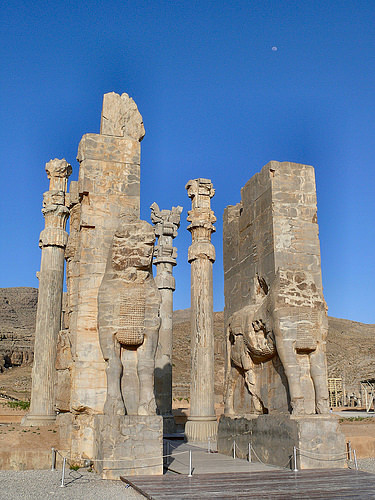
Xerxes' Building Projects & Death
Back home, Xerxes concentrated his efforts on making larger and grander monuments and completing greater building projects than his father. In doing so, he depleted the royal treasury to an even greater extent than his expedition to Greece already had. He maintained the roadways throughout the empire, especially the Royal Road by which messages were carried (the precursor to the Roman mail system and, later, the modern-day postal system) and devoted both time and funds to expanding sites such as Susa and Persepolis.
Although Darius' palace still stood, Xerxes' commissioned an even more elaborate building project to raise his own opulent palace nearby and also commanded the construction of the Hall of a Hundred Columns and the building which has been designated `The Harem' by archaeologists (because of the duplication of identical rooms in a row) which may have actually served as Xerxes' treasury. The exorbitant cost of these projects, coupled with the expense of the expedition to Greece, put a tremendous strain on Xerxes' subjects through heavy taxation. Xerxes, however, appeared not to notice a problem and continued to do as he pleased; because of this, some scholars mark his reign as the beginning of the decline of the Achaemenid Empire.
According to Herodotus, Xerxes' fondness for women and lack of restraint led to his pursuit of his brother Masistes' wife. When she refused him, he had one of his sons, Darius, married to the daughter of Masistes, Artaynte, in hopes that, by this union, he could get closer to his brother's wife and manage to seduce her. When he saw Artaynte, however, he desired her more than the mother and, when he approached her, she agreed to an affair.
Herodotus reports that, at about this same time, Xerxes' wife Amestris had woven him a beautiful shawl, which he liked so much he wore everywhere. Artaynte admired the shawl and, one day when Xerxes told her that he would give her any gift she asked for, she requested the shawl. He tried to get her to take any other gift instead because he knew that, should he give his mistress the shawl, his wife would discover the affair. He had given his word, however, and Artaynte refused any other gift, and so he gave her the shawl.
As he feared, Amestris heard that Xerxes' mistress was wearing the shawl and plotted revenge. She decided to focus her energies, not on the mistress, but on Artaynte' s mother who she blamed for not raising a proper daughter (and, perhaps, because she had guessed that Artaynte was Xerxes' second choice in a mistress). At the royal banquet known as Tukta, which was held once a year and at which the king granted gifts to his subjects, Amestris asked for Masistes' wife to be delivered to her. As with Artaynte and the shawl, Xerxes pleaded with Amestris to make any other request, but she would not do so.
Xerxes then gave his brother's wife to Amestris who, according to Herodotus, “sent for Xerxes' personal guards and with their help mutilated Masistes' wife. She cut off her breasts and threw them to the dogs, cut off her nose, ears, lips, and tongue, and then sent her back home totally disfigured” (9:112). In response, Masistes tried to raise a revolt in Bactra but Xerxes, hearing of his plans, trapped him and killed him, his sons, and all of the men he had rallied to his cause.
In c. 466 BCE, the Athenian general Cimon (l. c. 510-c.450 BCE) arrived in Persian-held Asia Minor to aid Greek cities which had declared their independence and encourage more to revolt. Xerxes sent a large land and sea force to deal with Cimon and bring the Ionian Greeks back under Persian control. Afterwards, Asia Minor could serve to launch a third invasion of Greece which would redeem Xerxes' earlier failure. His forces were defeated by Cimon, however, at the Battle of the Eurymedon in c. 466 BCE and Xerxes abandoned his hope of conquering Greece.
He then returned to his building projects and designs for greater, grander, monuments to commemorate his reign and distinguish him from his father. His developmental plans were cut short through his assassination by his minister Artabanus (a different man than his uncle of the same name) who also murdered his son Darius. Xerxes' other son, Artaxerxes I, then killed Artabanus, took the throne, and went on to complete Xerxes' grand building plans in his own name and for his own greater glory.
